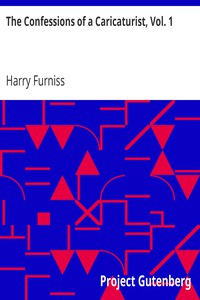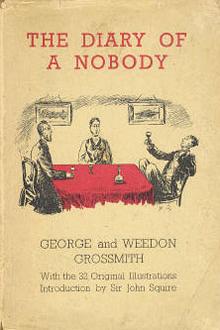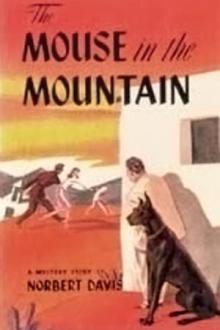The Confessions of a Caricaturist, Vol. 1, Harry Furniss [digital book reader txt] 📗

- Author: Harry Furniss
Book online «The Confessions of a Caricaturist, Vol. 1, Harry Furniss [digital book reader txt] 📗». Author Harry Furniss
At times he might enter into the artistic treatment of the cartoon; and I reproduce a sketch he did on the back of a menu to explain some idea in connection with the cartoon which appeared the following week in Punch.
Du Maurier's extremely clever conversation struck me the [Pg 224] moment I joined the staff of Punch. As I went part of his way to Hampstead, we sometimes shared a cab, and in one of these journeys I mentioned my conviction that he, in my mind, was a great deal more than a humorous artist, and if he would only take up the pen seriously the world would be all the more indebted to him. He told me that Mr. James had for some time said nice things of a similar character.
 SUGGESTION BY DU MAURIER FOR PUNCH CARTOON.
SUGGESTION BY DU MAURIER FOR PUNCH CARTOON.
About ten days afterwards I received a letter saying that my conversation had had an effect upon him, and that he was starting his first novel. So perhaps the world is really indebted to me, indirectly, for the pleasure of reading "Peter Ibbetson" and "Trilby;" the fact being that he had, with Burnand and myself, just visited Paris—the first time he had set foot in the gay city since his youth. Many things he saw had impressed him, and "Peter Ibbetson" was the result. How interesting it was to watch him in Paris, the place of his birth, standing, the ideal type of a Frenchman himself, smiling and as amused as a boy at his own countrymen and women. "So very un-English, you know!" Then, as we drove about Paris, he stood up in the carriage, excitedly showing us places familiar to him in his young days, and greatly amused us by pointing out no fewer than three different houses in which he was born! We three were the guests of Mr. Staat Forbes at Fontainebleau during the same trip, and du Maurier's sketches of our pleasant experiences on that occasion appear in Punch, under the heading "Souvenir de Fontainebleau," in three numbers in October, 1886. In the drawing of our al fresco dinner, "Smith" is our host, I am "Brown," du Maurier "Jones," and Mr. Burnand "Robinson."
Three years afterwards du Maurier re-visited Paris with most [Pg 225] of the staff to see the Paris Exhibition, 1889. In my sketch "En Route—Mr. Punch at Lunch," du Maurier is speaking to Mr. Anstey Guthrie, who, "for this occasion only," called du Maurier the Marquis d'Ampstead.
Du Maurier had a little of the green-eyed monster in his bosom, although he lived to laugh at all when he himself became the greatest success of any man in his sphere.
When I made my hit with my Exhibition of the "Artistic Joke," du Maurier, to my surprise, turned sharply round to me one night in the cab and said, "My dear Furniss, I must be honest with you—I hate you, I loathe you, I detest you!"
 DU MAURIER'S SOUVENIR DE FONTAINEBLEAU.
DU MAURIER'S SOUVENIR DE FONTAINEBLEAU.From "Punch."
"Thanks, awfully, my dear fellow! But why?"
"Ah!" he said, "your success is too great. When I get the return you send me in the morning, showing me the number of people that have been to your Exhibition, the tremendous takings at the turnstiles, the number of albums subscribed for, the number of pictures you have sold, I cannot work. I go on to Hampstead Heath to walk off my jealousy; when I come in to lunch I find your first telegram, telling me you have made �80 that morning. I walk out again, and looking down upon London, although I shake my fist at the whole place, my wrath is for you alone. I come in to tea to find another telegram—you have made �100! How can I sit down and scratch away on a piece of paper when you are making a fortune in a week?"
This nearly took my breath away.
"My dear du Maurier," I replied, "I feel hurt—seriously, [Pg 226] irrevocably. I shall always feel degraded in your eyes. Of course you are the victim of a practical joke."
Du Maurier pulled from his pocket one of my supposed returns. It was an imitation of printing, with the amounts filled in. "This is the kind of thing I get every morning."
"Why, of course, it is written, not printed. That is the work of the irrepressible practical joker. But it makes no difference, du Maurier; if you thought that I would be such a cad as to send you these returns, I cannot see how we can ever be great friends."
Although as du Maurier believed for a time I had the necessary vulgarity of the "bloated millionaire," to use his own words, we were never much more than acquaintances—although very pleasant acquaintances—and I believe du Maurier reciprocated the kind feeling I had towards him. Du Maurier rarely forgave a satirical thrust at his expense. His dislike for Mr. Whistler on this account is well known to all the early readers of "Trilby," and he often related with unconcealed glee a remark he once made to Whistler. It appears they had not met for a long period, during which du Maurier with his satirical pictures on the �sthetic craze, published in Punch, and Whistler with his "symphonies" and "harmonies" on canvas, exhibited in the Law Courts, had both increased their reputation.
"Hullo, Kiki!" cried Whistler. "I'm told that your work in Punch is the making of some men. You have actually invented Tomkins! Why, he never would have existed but for you! Ha! ha! how on earth did you do it?"
"Look here, Jimmy, if you don't look out, by Jove, I'll invent you!"
How Kiki—du Maurier—carried out his threat in "Trilby," and what resulted from it, all the world knows.
By the way, the mention of "Trilby" reminds me of a story about Mr. du Maurier's own Trilby which is perhaps worth recording. Du Maurier for some years lived on the top of Hampstead Heath, rather inaccessible for models. But more than once friends asked him to take a sitting from some lady or another, as he, drawing fashionable ladies, was different, perhaps, [Pg 227] from painters using models for costumes or, as du Maurier would say, for the "altogether." In this way a model was introduced to him, and, to his surprise, she drove up to his house in a hansom, and he heard her asking one of the servants for change of a sovereign to pay the cabman. She did not sit very well, so after a short time Mr. du Maurier told her that he only drew from models for part of the day, and, rather apologetically, said he of course did not pay for the whole of the usual day's sitting. And she said:
 PUNCH STAFF RETURNING FROM PARIS.
PUNCH STAFF RETURNING FROM PARIS.(The original hangs on the wall of Mr. Punch's dining room.)
"Oh, thanks! I am only too pleased to sit for a short time. But would you kindly ask one of your servants to fetch me a hansom?"
This made the artist more than ever miserable, and he said:
"Excuse me, but perhaps you are not aware we only pay a modest amount for sitters; in fact, I generally pay five shillings for two hours—aw——"
[Pg 228]
"You don't mean to say you are really going to give me five shillings? Oh, how kind of you! It will just pay half my cab fare home. I didn't know I was going to be so lucky." And she vanished, leaving the artist more bewildered than ever.
Some time afterwards, in Hyde Park, he was surprised to see a carriage beautifully appointed pulled up to where he was standing, and a lady lean out and say:
"I have never seen you before to thank you for your kindness in allowing me to sit for you. I was so anxious to see what a studio was like. Thanks, awfully; you must let me call again."
Du Maurier had the faculty of unaffected fun, he had also a feeling for caricature in portraiture, but he did not care to exercise either to any extent in Punch. I recollect Sir Henry Thompson—the celebrated physician—showing me a copy of a book he had written, in which he speaks of hospital life in London. Du Maurier had studied in a London hospital when he first arrived in England, and he wrote to Sir Henry, then a stranger to him, to ask him if the wretch in his book who wheeled off the remains of the corpses from the dissecting-room was the same man he knew and loathed years ago. The sketch accompanying this query Sir Henry had pasted in the book in triumph. "There is the man," he said, "to the life!"
At dinner du Maurier ate sparingly, drank moderately, and smoked cigarettes. He avoided champagne, preferring the wine of his country—claret; and after dinner, in place of coffee, he had a huge breakfast-cup of tea, and, like the soap advertisement boy, he was not happy till he got it.
Mentioning an advertisement suggests that it may interest some to know du Maurier drew the label for a most popular mineral water. It is safe to predict that not one person in the tens of thousands looking at it yearly would connect du Maurier with it. It is that elaborate and rather inartistic design on Appollinaris water, for which he received fifty guineas from his friend—one of the proprietors. Anyone following his work in Punch must have noticed that he was a hypochondriac.
[Pg 229]
 JAPANESE STYLE: A BALLET FROM PUNCH.
JAPANESE STYLE: A BALLET FROM PUNCH.
[Pg 230]
[Pg 231]
Hypochondriasis was a disease with him, he was always thinking of his health, and I fear that sudden burst of popularity following the success of "Trilby," in place of bracing him up, made him dwell somewhat more upon his state of health, and hastened the end.
I recollect his telling me years ago he was advised to take horse exercise for his health's sake, so he hired a hack and started in the direction of Richmond Park. Arriving at the well-known windmill, and before descending the beautiful slopes on the other side, he took out his watch and, opening the case, put out his tongue to see what effect the ride had had on his health. The horse moved, and he found himself the next moment on the ground.
He gave up horse exercise after that!

My first contribution to Punch appeared in the number dated October 30th, 1880. "Punch," as a policeman, commanded the removal of the newly-erected "Griffin" in the place of Old Temple Bar: "Take away that Bauble!" The much-abused "Griffin" is the work (but after the design of Horace Jones) of an old friend of mine, the late C. B. Birch, R.A., a clever sculptor and a capital fellow. He sent me "his mark" of appreciation, but I may say he was the last man to use the instrument of torture suggested by his name.
I then "did the theatres" with the editor—no mistake this time—and a very pleasant time it was. My first "social" drawing appeared in the second number in the following December, illustrating Scotch "wut" manufactured in London.
Two Scotch rustics outside an eating-house. One points to a card in the window on which is "Welsh Rabbit, 6d."
Hungry visitor (ignorant of the nature of this particular delicacy): "Ah, Donal, mon, we ken weel hev the Rawbit fur saxpence. We ken get twa Bawbees fur the Skeen when we get bock to Glasgow!"
The Scotch is certainly new, if the joke is not.
[Pg 232]
 CHINESE STYLE. FROM A DRAWING ON WOOD. PUNCH.
CHINESE STYLE. FROM A DRAWING ON WOOD. PUNCH.
An Irish joke followed, and then in the Almanack I illustrated a hit at the style of ladies' dress of the period; in fact, at that time I drew for Punch quite a number of social subjects dealing with the �sthetic craze. Besides illustrating various social subjects and caricaturing the Academy and the new plays, I was illustrating the "Essence of Parliament." As Mr. M. H. Spielmann in "The History of Punch" says truly, "I romped through Punch's pages." I open a number of Punch published only eighteen months after





Comments (0)